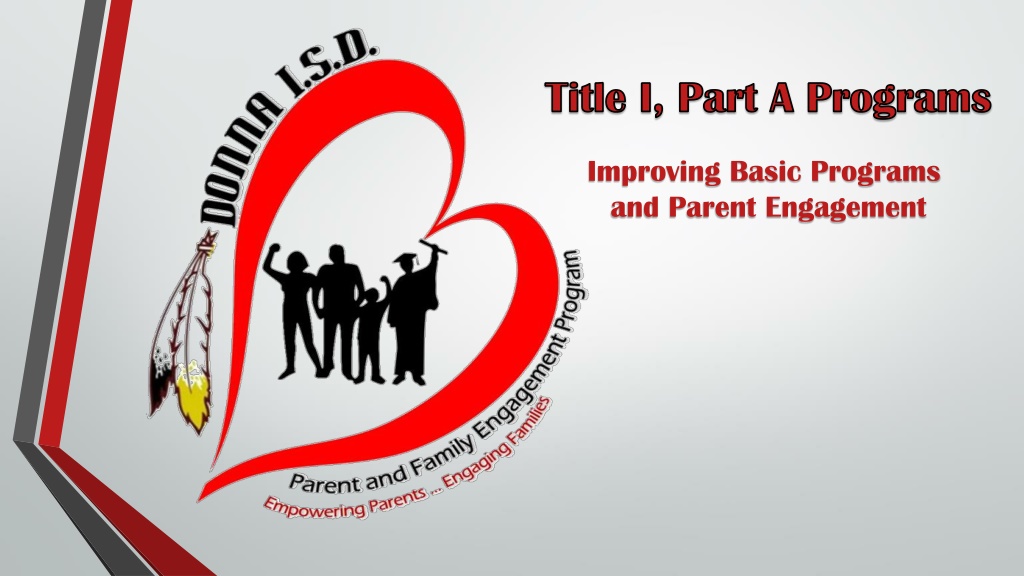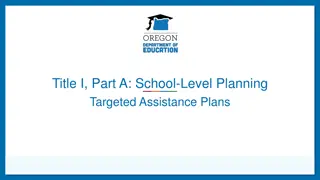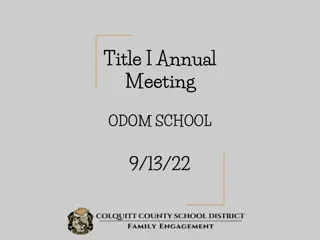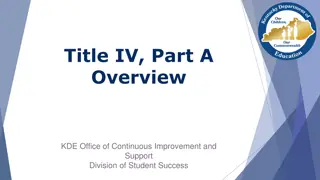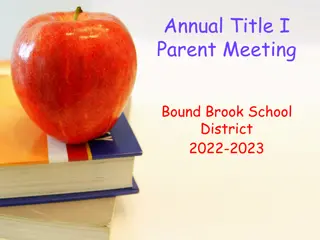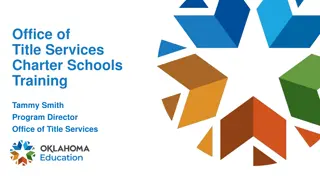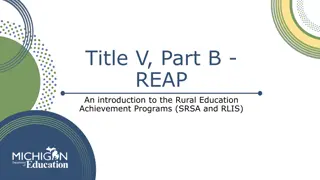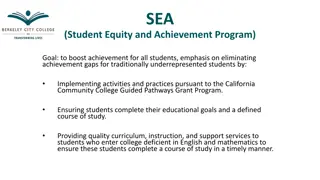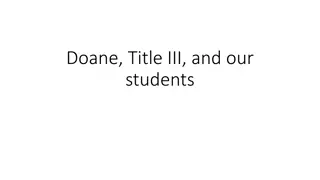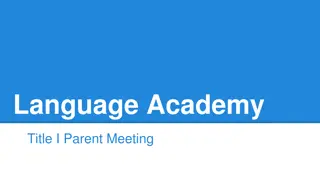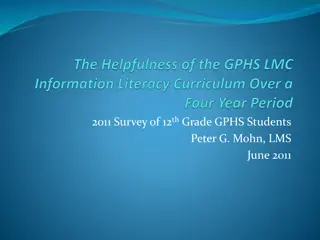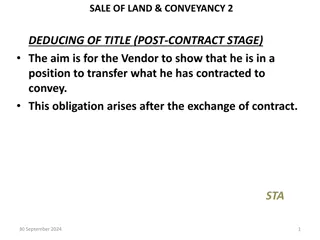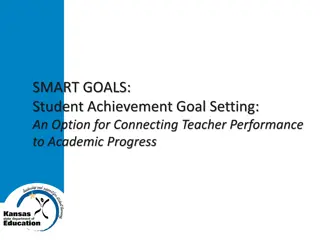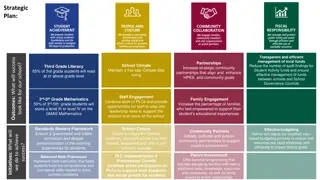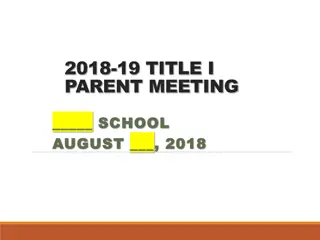Enhancing Student Achievement through Title I Programs
Title I, Part A programs at Donna ISD focus on improving basic education programs and increasing parent engagement. Schools receiving funding under ESEA work on extensive planning, ensuring highly qualified staff, providing information to parents, and involving parents in campus decision-making to enhance student academic success.
Download Presentation

Please find below an Image/Link to download the presentation.
The content on the website is provided AS IS for your information and personal use only. It may not be sold, licensed, or shared on other websites without obtaining consent from the author.If you encounter any issues during the download, it is possible that the publisher has removed the file from their server.
You are allowed to download the files provided on this website for personal or commercial use, subject to the condition that they are used lawfully. All files are the property of their respective owners.
The content on the website is provided AS IS for your information and personal use only. It may not be sold, licensed, or shared on other websites without obtaining consent from the author.
E N D
Presentation Transcript
Title I, Part A Programs Improving Basic Programs and Parent Engagement
Title I at Donna ISD? Twenty-two schools in the Donna ISD receive funding under Title I, Part A of the Elementary and Secondary Education Act (ESEA). The funding is for resources to help schools with high concentrations of students from low-income families provide a high standards. ESEA is built on accountability for results, involvement of parents, and an emphasis on doing what works to improve academic achievement based on scientific research.
EXTENSIVE PLANNING: Each Title I School wide campus must engage in detailed planning on how funds will be used to improve student academic achievement. This planning includes: Comprehensive Needs Assessment: created by the school administrators, staff, parents and community members to identify the needs for all students to meet Texas achievement standards. Campus Improvement Plan: the action plans that will be implemented to meet the needs identified in the Comprehensive Needs Assessment (CNA). Budget Plan: detail of accounts and amounts that will be used to implement the action plans identified in the Campus Improvement Plan. This can include funding for parent education programs, additional instructional staff, instructional materials, and tutoring programs. Annual Evaluation: Each campus must evaluate the activities used to address needs over the past year. Activities that did not have a high-impact on student achievement must be improved upon or eliminated.
HIGHLY QUALIFIED STAFF: Title I School wide campuses must follow specific rules regarding the quality of the instructional staff: Highly Qualified Teachers: each teacher on the campus must meet the Highly qualified criteria set forth by the State. Highly Qualified Paraprofessionals: every instructional paraprofessional employed on a Title I School wide campus must meet the Highly Qualified criteria. In addition, paraprofessionals may not teach a class without a HQ Teacher present, and may not pull-out students for individual, or group work, away from the instruction of the highly qualified teacher.
INFORMATION FOR PARENTS: Title I School wide campuses are responsible for providing parents with: Annual Title I Meetings that explains the Title I program at the campus. Academic information that details the curriculum in use at the school, forms of academic assessments used to measure student progress, proficiency levels students are expected to meet, and an explanation of the State s academic content and achievement standards.
PARENTS INVOLVED IN CAMPUS DECISION-MAKING: The school must involve parents in the planning, review and improvement of the: Schoolwide Plan (Campus Improvement Plan), including the use of Title I funds. Parent Involvement Policy, including details of how parents will be informed of their rights under Title I, provided a description of the curriculum in the use at the school, AND afforded opportunities for regular meetings and participation in campus decision-making and decisions regarding the education of their child. School-Parent Compact, detailing, at least, the basic expectations between parents, students, and the school staff. A yearly parent-teacher conference must be held at the elementary level with every student s parents to discuss the school-parent compact as it relates to the individual child s achievement.
PARENT EDCUATION: Each school should use the majority of Parent Involvement funding to provide training and skills to parents to assist them in being a partner in educating their child. Examples of this type of training could include: (1) strategies in math, science, reading, writing, and social studies, (2) literacy training, (3) using technology, and (4) parenting skills.
BE INVOLVED IN YOUR CHILDS EDUCATION It only takes a few minutes-Attend parent-teacher conferences, Open House,, Literacy, Math, or Science family nights, chaperone a school event, check your student s folder, access the Parent Portal. Ensure that your child READS 20-30 minutes every day. Reading is the basis for all academic areas so encourage your child to read! Ask your child questions. Be specific. Ask open-ended questions such as: (a) What did you study today in Reading/ELA or Science? (b) What did you do in Math today? (c) Tell me something interesting that happened at school today? Ask to see your child s class work on a weekly basis. Be positive about the work and try not to compare it to another child s work-just show your interest. Talk about school in a positive way!
TIPS FOR PARENTS Agree on a time for homework on a daily basis. If your child does not have homework on a given day, have him use the agreed upon time to review prior work or read for pleasure. Arrange a quite place for study and provide: clear work surface; comfortable chair & good lighting; dictionary, pen, pencil and paper; Be ready to help but remember to: let the child do their own work; be patient - explain as best you can but let him or her work through it; Show respect for study: do not watch TV or talk with friends while your child is studying.
Thank you for your Support!!! Tomas Tamez, Parent and Family Engagement Director Ph: (956) 464-1600 ext. 1230 E-mail: ttamez@donnaisd.net Norma L. Guevara, Secretary Ph: (956) 464-1600 ext. 1230 E-mail: nlguevara@donnaisd.net
